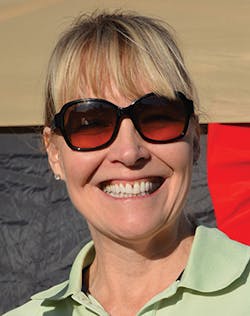Sue Maki views her mission as raising community awareness of the water-energy nexus and the impact of climate change. Maki managesenvironmental initiatives, community education, and public relations for Carmel, IN’s water and wastewater utility as well as the community’s household hazardous waste and recycling programs. In doing so, she has learned about the interconnectedness of it all—such as how runoff from trash can affect water quality. After Maki took her position and began to be aware of the environmental cross connections among her various responsibilities, she took the LEED AP exam.
“Through exam prep and the subsequent CE credit requirements, I have learned about the wide range of environmental issues,” she says. By working in the insurance industry before entering the water utility sector, Maki brings to the table an awareness of liability issues associated with the water sector. “Some people will say, ‘Let’s just shut off that customer’s sprinkler system’ and I say, “Well, yes you can but you can’t, either. You have to be cognizant of potential problems with that.”
Community education can be a challenge in a city that is “water rich” compared to other US regions, notes Maki.
“There are a lot of people who don’t think we need to conserve water because we have plenty of it,” she says. “When you talk about its embedded energy and the impact of climate change, that adds more to people’s understanding.”
Maki endeavors to get the message out through community events and Web-based educational efforts. However, rate changes have been one of the biggest drivers of behavior modifications.
“Instead of a declining rate structure—the more you use, the less you pay per gallon—we went to an inclining rate structure. Hit people in their wallet and that produces change,” says Maki.
Carmel’s elected officials do not want to impose watering ordinances on users, so Maki works with city’s largest irrigation contractors to ask the biggest water users if they will voluntarily change their irrigation system programming to ease up on peak demand times. The effort has demonstrated some improvements.
What She Does Day to Day
Maki answers residents’ e-mails and plans the utility department’s participation in community education events. On behalf of the mayor’s office, Maki manages the Carmel Neighborhood Association Network, a group of the city’s homeowners’ associations and a small business owners’ group. “It’s a communication vehicle I can reach out to for water or trash issues,” she notes.
What Led Her Into This Line of Work
Maki earned a B.A. in political science and business from Baldwin Wallace University. After 18 years in the insurance industry, she earned an MBA from Anderson University. Instead of returning to the corporate world, she went to work for Carmel, doing fundraising and volunteer management for the parks department before taking her current position.
What She Likes Best About Her Work
Helping water customers solve their problems and “making Carmel a great place to live” gives Maki immense satisfaction. For the utilities to keep costs low and avoid building another water plant to service peak season means educating the customers to the point where there are good outcomes, notes Maki.
Her Biggest Challenge
Carmel’s peak water use season of July and August presents Maki with her biggest challenges, partly because the city’s water supply relies totally on groundwater.
“Because of that, we’ve had to soften it,” she says. “Sometimes it’s the peak season and the demand is too much, so the softening process is bypassed. That means people are getting hard water in their house and boy, do the phone calls come in! It’s part of the cycle of trying to educate. If we didn’t have the huge peak demands, we could do the softening cycle consistently and therefore you wouldn’t have that hard water. We’ve made some steps forward, but there’s still a lot of work to do.”
Another challenge: bringing awareness to the community over the impact of climate change and the water-energy nexus. “I am trying to make people aware of that issue so that they can change, even if they don’t have an automatic irrigation system,” she says. “They can make an impact on climate change just by their water use.”
